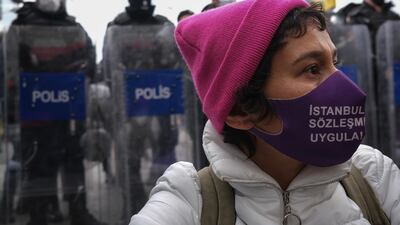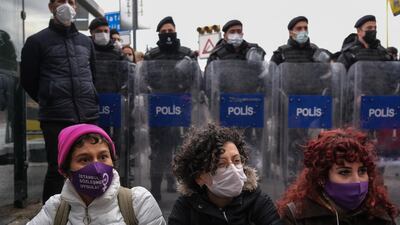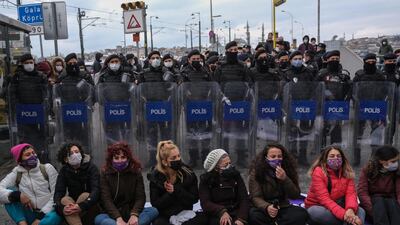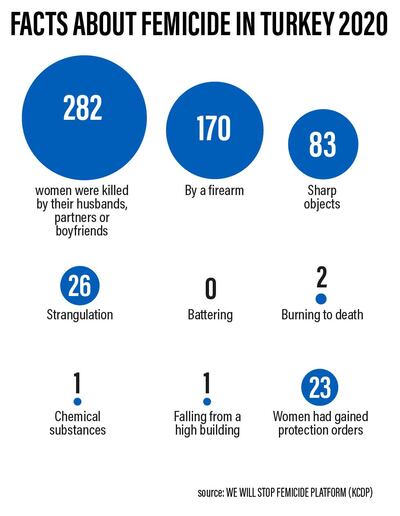Women in Turkey are being murdered in unprecedented numbers because legislation designed to protect them from domestic violence was not implemented, campaigners tell The National.
Yazgul Soro was 57 when her husband murdered her last year in the city of Izmir, according to the Turkish campaign group We Will End Femicide.
She left six sons and daughters behind.
Fatih Alsan murdered his former girlfriend, Yasemin Aydin, 41, before fleeing to Istanbul and eventually turning himself in to the police, Turkish media reported.
And Ece Cicek was just 18 when her husband took her life in their house in Konya, a city south of Ankara.
Her family remember her as bright, thoughtful and caring.
In these cases, as in hundreds of others, the men accused displayed obsessive and controlling behaviour towards their victims, according to media reports.
Last year, 282 women were killed in incidents of domestic violence in Turkey.
Until March, women in Turkey had the law on their side to confront abusers in the form of restraining orders that were automatically renewed under the terms of the Council of Europe’s Convention on Preventing and Combating Violence Against Women and Domestic Violence, known more commonly as the Istanbul Convention.
But on March 20, President Recep Tayyip Erdogan made a sudden overnight announcement that Turkey was withdrawing from the convention.
The treaty ironically carries the name of Istanbul because it was opened for ratification in the city in 2011 and came into force in 2014. Turkey is the first state to pull out of it.
In response to the withdrawal, women across Turkey launched campaigns on social media in protest, while demonstrations convulsed Istanbul and other key cities.
'Licence to kill'
Melek Onder, an activist, told The National why she and fellow feminists are determined to reverse what she calls a "licence to kill issued by an Ottoman-style sultan".
“The women are angry after this decision. But they are also determined to fight. The responsible people are those who normalise violence against women and do not implement relevant laws. The responsible people are those who withdraw from the Istanbul Convention.
“Women of all ages are being killed every day in Turkey. Women are left alone with violence,” said Ms Onder, a representative of the We Will Stop Femicide Platform (KCDP).
More rallies are planned across Turkey to reverse the threat to the safety of women and to demand their human rights.
“We held a demonstration in Taksim Square on Monday [March 22]. First, they tried to stop us by arrests. Afterwards, they tried to corner us by deploying dozens of police, but we continued our protest.
"Our slogan was ‘withdraw the decision, apply the convention'. We won’t give up,” said Ms Onder, whose organisation is providing key legal support for victims of abuse and violence.
The convention is more important now than ever with Covid-19 measures such as lockdowns leading to a surge in reports of violence against women and girls.
The United Nations Entity for Gender Equality and the Empowerment of Women (UN Women) said domestic violence was already one of the greatest human rights offences.
During Covid-19 lockdowns, many women and girls are isolated in unsafe environments where they are at heightened risk of experiencing intimate partner violence.
About one third of women worldwide experienced physical and/or sexual violence by an intimate partner between October 2019 and October 2020.
In the most extreme cases, violence against women is lethal. Globally, an estimated 137 women are killed by their intimate partner or a family member every day, UN Women says.
Many of the victims are trapped at home with their abusers.
The Istanbul Convention sets minimum standards on prevention of violence, protection and support for women and girls at risk, and the criminal prosecution of perpetrators.
The government says that a law adopted in 2012 adequately protects women against violence, while the convention threatens family values.
With the number of divorce cases on the increase, the government says the law encourages women to seek same-sex relationships. It also says there are many laws in Turkey that empower women and protect their rights.
The 2012 Protect the Family and Prevent Violence against Women law says women who report domestic abuse have a right to protection and allows for restraining orders against abusive partners.
It also allows women to change their credentials and relocate with their children.
Feminists and rights activists say it is not about the number of laws but, rather, enforcement and accountability.
They say sexist rhetoric used by Mr Erdogan, who once called women who are not mothers “incomplete”, gives misogynistic policemen free rein to suppress women who report domestic violence.
Burcu Karakas is a Turkish investigative journalist who reports widely on violence against women.
She believes that Mr Erdogan's gender policies define women only within the sphere of the family, never considering them as individuals.
"Family is seen as a 'sacred union', which should be protected from all possible dangers such as divorces or homosexuality. Family union is above all – even above the life of a woman. If women are subjected to violence, they should keep silent and be patient. This is the message that political power is delivering for a while," Ms Karakas tells The National.
Ms Karakas, who campaigns for gender equality, says women in Turkey are fed up with the victim-blaming attitude of male officers in police stations.
"Law enforcers are responsible for applying the law, not traditions or religious beliefs. However, unfortunately, the latter is in force now," she says.
There is a prevailing sense of hopelessness in reporting violence, as men advise abused women to resort to counselling instead of holding abusive partners accountable.
Ms Onder, the activist, believes that the incumbent government wants women to live within the boundaries of what it deems to be "desirable women".
“The convention tells us to create a society that is preventing violence. It’s very similar to the concept of a Covid vaccine that prevents disease. There is indeed a vaccine for violence against women, and we think it's gender equality."













